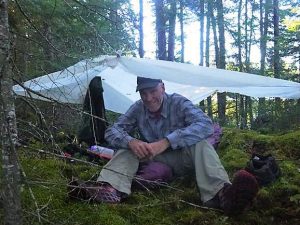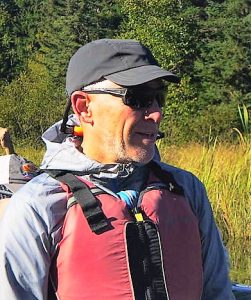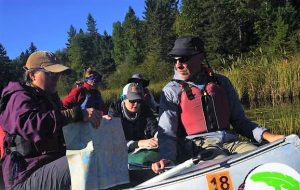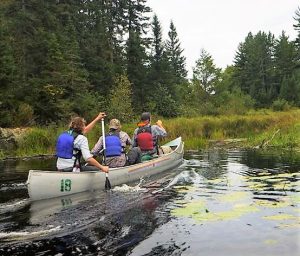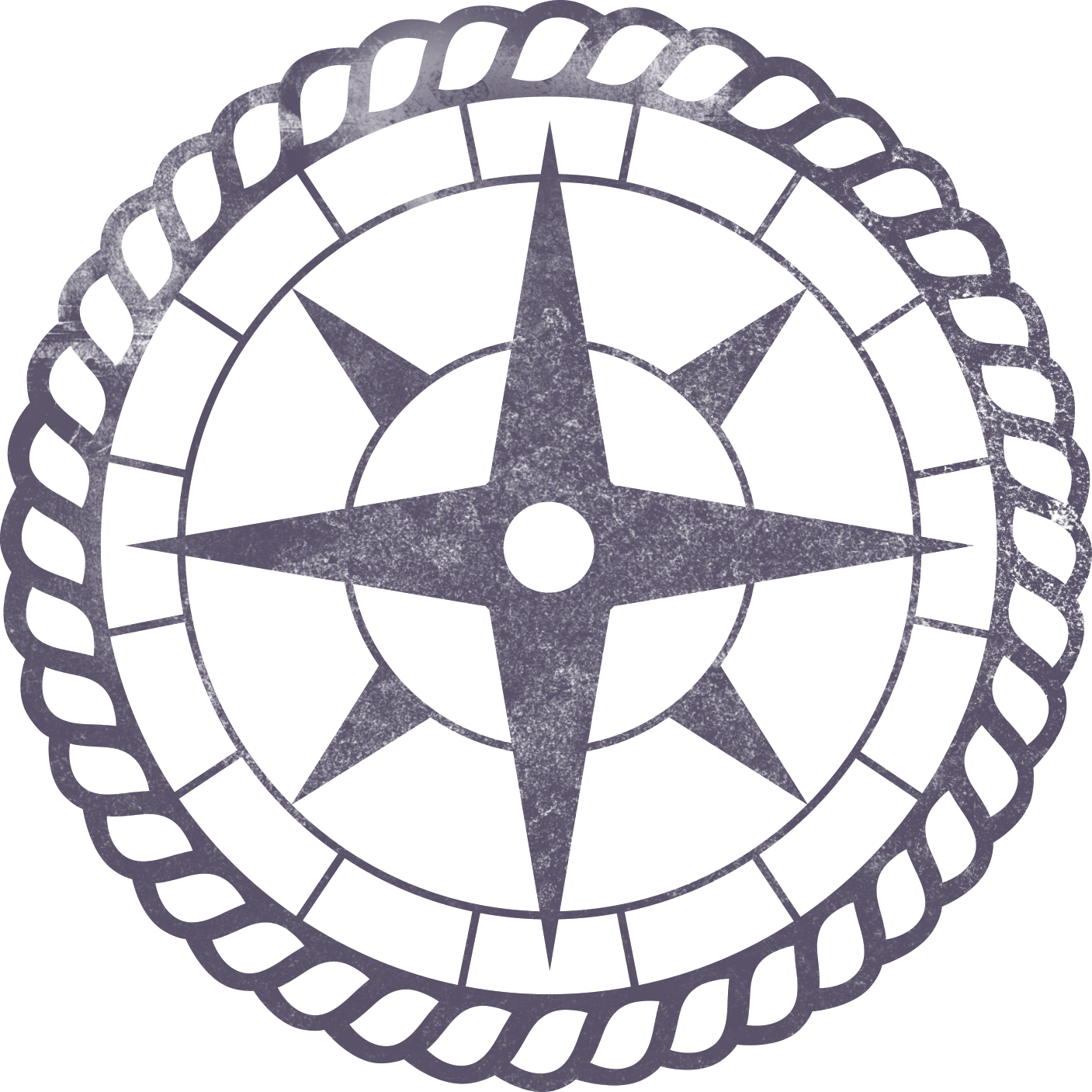When I met Bob Chase, I did not know his profession, or his last name.
Bob and I and five other strangers got to know each other in the context of an Outward Bound course. Our instructors, Dave Casey and Rachel Hedlund, gave us very strict instructions not to discuss what we do for a living. This was a challenge; if you’ve ever tried to avoid talking about your job, you quickly find out how much adults lean on this (and the weather) for polite (and not-so-polite) conversation. You can’t default or posture your way through interaction. You can’t hide behind a title or a set of expectations, you just have to show up and be who you are going to be. Easier said than done, but very liberating! Children have the benefit of building relationships without baggage, and adults rarely get to experience such freedom in modern life. On course, it’s anonymity, but with a catch. The catch is challenge. On an Outward Bound course, you get pushed to the edge of your comfort zone, and sometimes shoved right over it. How you cope with this challenge is who you are. Only you know what’s in your luggage and how it shapes your coping skills.
Well, I came to know Bob as an observant, thoughtful, selfless person who leads by quiet and steadfast example.
In addition to his command of calm, Bob leavened tense situations with dry humor and did surprising things like plead ignorance in the face of complicated knots. Bob is a tall and incredibly fit man, a guy who might intimidate you with his mastery of his own body if he wasn’t so damned humble. On a particularly tough portage, at the end of day four, Bob stopped to help me into my mondo pack (I was about to fall over backward under the weight). I had crossed out of my comfort zone long since, and was privately wallowing in self-pity. Bob said, “Geez, I just can’t carry that canoe anymore. My neck is killing me. I’ll carry your pack if you’ll help me with the canoe.” I’d never question Bob’s honesty, but his admission and offer were so perfectly timed, they lifted me up out of myself and back into the reality of our shared experience. I wasn’t alone.
A couple of weeks ago, Bob emailed me a simple note, “I thought you might like this.” Attached to the email I discovered a profoundly moving piece of writing by Dr. Fred Hund called, “Guiding” (which you will find a link to below). I like this beautiful writing all the more because Bob shared it with me. Dr. Hund gives me a glimpse into Bob’s experience, and begins to reveal a bit of Bob’s soul. And if I know anything about Bob’s soul, I know he is a quietly passionate man. On day seven, we tested our limits on the Homeplace High Ropes course. I was standing down below when Bob jumped into his final triumphant descent on the zipline. Bob didn’t shout, “Geronimo!” or “Whahoooo!” Bob shouted, “Jeeeeaaaan!” “Jean” is Bob’s power word. Jean is Bob’s wife.
I believe you will find that Bob has a deep and abiding love, not only for his wife and family, but for challenge and adventure in the wilderness. What follows is a short interview with the very humble Bob Chase:
M: “You and I met on an 8 Day Boundary Waters Canoe Expedition last fall. Our instructors asked the seven of us to refrain from sharing what we do for a living while we were on course together. It was so interesting to get to know each other without this information, and we managed to keep our secrets until our good-bye breakfast! The big reveal was full of surprises, and your “secret” was no exception. Can you tell our readers what you do for a living?”
B: “I am a physician.”
(To say the least! The introductory paragraph to Bob’s bio reads, “Dr. Robert A. Chase, MD, MS, FACP, brings over twenty-five years of extensive and diverse experience in healthcare to his role as Chief Medical Officer at Westlake Hospital and West Suburban Medical Center. Dr. Chase is a published author, educator, executive, leader and clinician with expertise in infectious diseases, infection control, clinical epidemiology and population health.”)
M: “You were one of three medical professionals on our course. If I’d known ahead of time, I might have been less nervous about rock climbing! We all thought it was pretty amazing that 3 out of 7 folks–almost half of us–were in your field. You yourself have been on a couple of Voyageur Outward Bound Expeditions now. Why do you think you and your colleagues seek out adventure and challenge? Isn’t medicine challenging enough?”
B: “I cannot speak for the others- I suspect that we all have our own reasons for embarking on these sorts of things. I chose to go on Outward Bound expeditions in order to get some time away from the pressure and intensity of my work. I wanted to be challenged along different dimensions than those challenges associated with “regular life.” I hoped to grow in some way that would help me be more effective when I got home.”
M: “Do your expeditions play a role in the rest of your life?”
B: “Absolutely. What I observed with OB was a three phase development process which helped me develop both personally and interpersonally. When I first entered the program, I was focused on personal goal attainment– basically developing the courage, strength and endurance to just get through the course. This was followed by a second phase which was centered on working with others. Throwing a number of people together who don’t know each and other and come from vastly different backgrounds and experiences can be unnerving, especially when we quickly learn that we are interdependent and need to come together and function as a team. The final phase for me was the transition from working with others to caring about others– to the point where one’s focus shifts from worrying about oneself to truly focusing on the needs of one’s teammates. It’s amazing how over such a short period of time (8 days in our course) we move from being complete strangers to something almost like family.
In my work in medicine, I see people struggling with difficult life situations who initially just try to get through it, then are changed themselves through the process of coping (hopefully in a positive way). Through that change in themselves, they are able to have an impact and influence others who are going through tough times. I think OB is an experience which facilitates that type of growth in people.”
M: “What does your family think about your adventures?”
B: “They love them and are very supportive of them. As a matter of fact, my wife and daughters are the ones who principally select the courses and arrange the details of my participation.”
M: “I believe your first VOBS Expedition was a Dosled and Skiing trip. Can you share a highlight from that course?”
B: “The highlights are many and I have great memories and feelings about that course. The dogs were great, the scenery was spectacular and the other folks on the course were terrific. We were also blessed with two wonderful instructors- Sam and Sully. I’ve done four OB courses and a NOLS course, with this one probably being the most memorable one of them all.”
M: “I think I remember you mentioning sleeping on the ice, listening to the wolves circle the lake and being too cold to expose bare skin. As I recall, Sully fed everyone cookie dough through a hole in your sleeping bags. Those winter expeds are known for being pretty rigorous. What was the most challenging aspect of the experience?”
B: “Yes, the Dogsled and Skiing Course was without a doubt the most rigorous course I’ve taken (and the one that generated the most stories!). When we were out there a polar vortex descended over the Boundary Waters. We weren’t sure what the temperature really was (because all the fluid in the thermometers was down in the bulbs and the temperature was too cold to register) but I later learned that we averaged about -35 to -45 F the whole time. I remember that for a period of a few hours the temperature actually did register and we noted it got as warm as -15, but that didn’t last too long.
Another thing I remember is that we were issued boots that were very heavy. Running through the snow alongside the sleds in those heavy boots was a challenge in and of itself. Sam & Sully were smart, they had mukluks that were very warm and lightweight. My strongest recommendation to somebody thinking about that course would be to get some mukluks– I got a pair and they’re truly wonderful.”
M: “Why did you return to Minnesota for another Expedition?”
B: “My experience with my first VOBS course was amazing, I wanted to see the BWCA in the fall, and I wanted to give Sully a hug.”
M: “:) Ahhh! The Sully hug! What’s your next adventure, Bob?”
B: “Jean and I are going to hike Glacier National Park this fall.”
M: “Maybe next time we’ll see Jean on course!”
Thanks to Dr. Bob for sharing his reflections and thanks to Dr. Fred Hund and Annals of Internal Medicine for graciously sharing, “Guiding” with us; here’s a link to “Guiding” by Dr. Hund and an excerpt to tempt you:
“Rivers are never the same. Warmth in the mountains means more snowmelt, and now the Green River is a lot bigger. Now Indian Joe Rapids looks safer going right. “Could also go left first, then right. Or . . . maybe right down the middle. What do you think?” Same river, always different, but always going downstream. With skill, you find the best way through. “Mrs. Erickson, your cancer has grown and spread. I’m sorry. We can’t cure it, but we can talk about some choices.”
Join us for challenge, adventure…and empathy. Reach out to Outreach: marlais.brand@vobs.org


